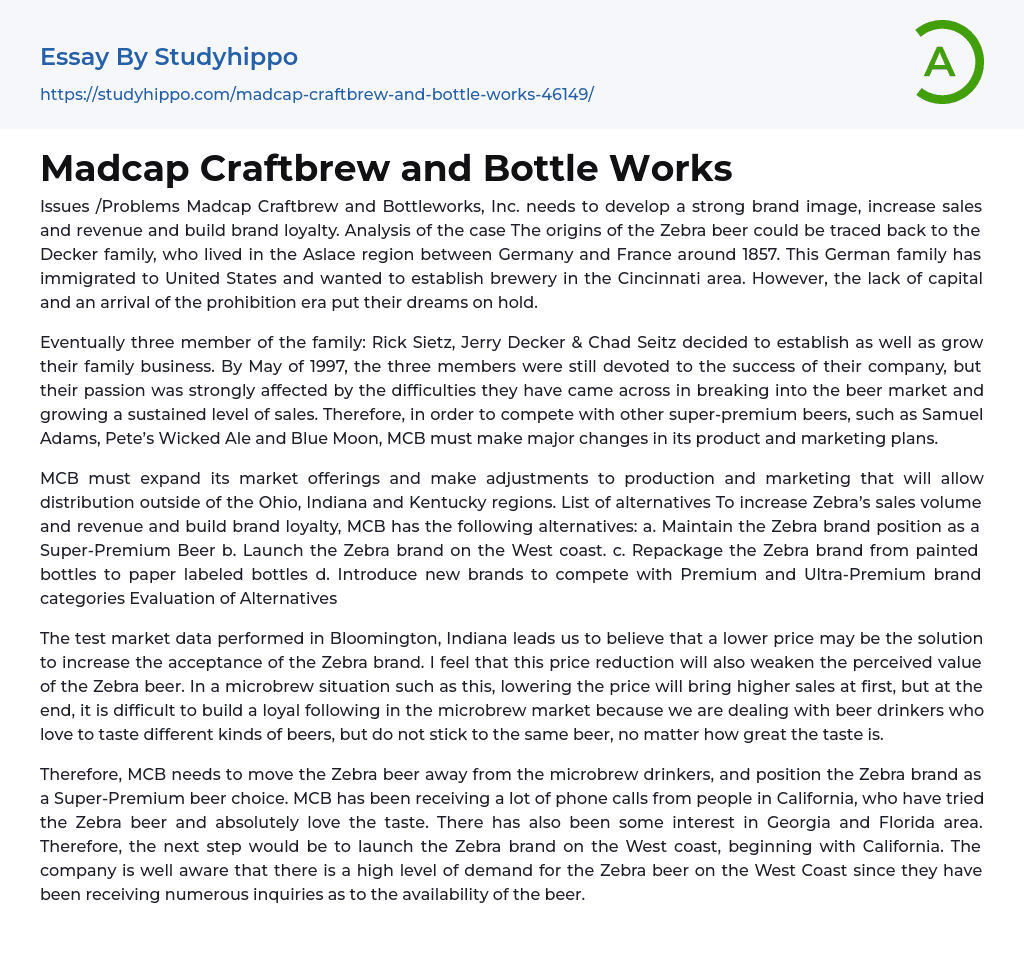Madcap Craftbrew and Bottleworks, Inc. is dealing with several challenges including the requirement to build a solid brand image, enhance sales and revenue, and foster loyalty towards their brand. After analyzing the case, it becomes evident that the Zebra beer can's roots can be traced back to the Decker family. The Decker family, originally from Germany, lived in the Alsace region between Germany and France before moving to the United States with intentions of establishing a brewery in Cincinnati. However, their dreams were thwarted by insufficient funds and the onset of prohibition.
Eventually, Rick Sietz, Jerry Decker, and Chad Seitz, three family members, decided to establish and grow their family business. However, by May of 1997, these three members' passion for the company's success was greatly impacted by challenges they encountered in entering the beer market and achieving consistent sales. To compete with other super-premiu
...m beers such as Samuel Adams, Pete’s Wicked Ale, and Blue Moon, MCB needs to make significant changes in its product and marketing strategies.
MCB needs to broaden its market offerings and revise production and marketing strategies to enable distribution beyond the Ohio, Indiana, and Kentucky regions. Here is a list of alternatives available for MCB to increase Zebra's sales volume, revenue, and brand loyalty:
a. Maintain the current position of the Zebra brand as a Super-Premium Beer.
b. Expand the distribution of the Zebra brand to the West coast.
c. Repackage the Zebra brand by replacing painted bottles with paper labeled bottles.
d. Introduce new brands to compete with Premium and Ultra-Premium brand categories.
These alternatives need to be evaluated for their effectiveness.
The market research conducted i
Bloomington, Indiana suggests that a decrease in price could potentially boost the popularity of the Zebra brand. However, it is important to acknowledge that reducing the price may also lessen the perceived value of Zebra beer. In a microbrew setting like this, lowering the price initially may lead to a temporary increase in sales. However, it is challenging to cultivate a loyal customer base in the microbrew market since beer enthusiasts tend to enjoy trying various types of beer rather than sticking to one, regardless of its taste quality.
In order to cater to a new consumer group and establish the Zebra brand as a Super-Premium beer option, MCB must distance it from microbrew drinkers. Numerous California residents have called expressing their satisfaction with the taste of Zebra beer. Moreover, there has been interest expressed in Georgia and Florida as well. Hence, the initial move is to introduce the Zebra brand on the West coast, beginning with California. The company is fully aware of the strong demand for Zebra beer in this area, evidenced by numerous inquiries about its availability.
By entering into a contract with the West coast brewery, MCB can experience various benefits such as increased sales, improved brand awareness, and revenue growth. This will enable MCB to establish itself as a long-term player in the lucrative beer market. Additionally, repackaging Zebra brand beer using a more cost-effective paper label could potentially enhance profit margins per case and resolve supply issues associated with bottles from Mexico.
According to estimates, MCB could save $0.50 - $1.00 per case by using standard bottles with paper labels. Additionally, distributors and retailers consider the paper labels to
be of higher quality. As a result, MCB should capitalize on these savings and perception by switching from painted bottles to ones with paper labels. It is suggested that Zebra brand be positioned as Super-Premium Beer, while also advertising the MCB name to attract Premium and Ultra Premium markets.
MCB should nationally launch its brands by partnering with regional breweries for production and distribution purposes, enabling lower costs and generating higher sales volume along with brand loyalty. Additionally, MCB should concentrate on capturing the Ultra-Premium Beer market, despite the considerable time and capital investment required. Given the exceptional and distinct flavor of MCB's beer, it is definitely worth pursuing the Ultra-Premium market as well.
Make a decision on an alternative and provide support for it. In my opinion, all of the options mentioned should be implemented. The beer market is highly competitive, so MCB should continue positioning the Zebra brand as a Super-Premium brand. At the same time, efforts should be made to minimize costs by repackaging the Zebra beer. Furthermore, MCB should introduce the Zebra brand on the West coast and target the Premium and Ultra-Premium brand categories. By making these changes, MCB will thrive and continue to operate as a successful and sustainable business entity in the long run.
- Brewing essays
- Brewery essays
- Wal-Mart essays
- Discover essays
- Beef essays
- Beer essays
- Beverages essays
- Bread essays
- Burger essays
- Cake essays
- Coconut essays
- Coffee essays
- Cooking essays
- Crowd essays
- Cuisines essays
- Dairy essays
- Desserts essays
- Dinner essays
- Drink essays
- Fast Food essays
- Favorite Food essays
- Food Safety essays
- Food Security essays
- Food Waste essays
- Fruit essays
- Ginger essays
- Hamburger essays
- Ice Cream essays
- Juice essays
- Lemon essays
- Meal essays
- Meat essays
- Oreo essays
- Organic Food essays
- Pizza essays
- Rice essays
- Sainsbury essays
- Sugar essays
- Taste essays
- Tea essays
- Wine essays
- Advertisement essays
- Advertising essays
- Anheuser-busch essays
- Audience Theory essays
- Brand essays
- Brands essays
- Competitor Analysis essays
- Consumer essays
- Detergent essays




